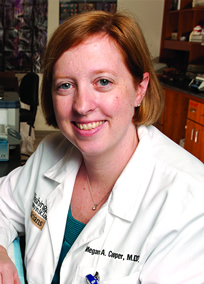Patients with autoimmune diseases who do not respond appropriately to treatment may be more complex than they first appear. They could also be immunodeficient.
Primary immunodeficiencies are associated with the development of a number of autoimmune disorders. The combination of autoimmunity and immunodeficiency can also become a problem in patients who are on immunosuppressive or immunomodulatory medications.

“We need to think about how our patients who have autoimmune diseases might be affected by our treatments,” said Megan Cooper, MD, PhD, Assistant Professor of Pediatrics at Washington University School of Medicine in St. Louis. “It is very possible that our treatment could alter their condition and make them immunodeficient. As rheumatologists, we all give patients immune suppressants. We need to be thinking a bit more about how we are not just treating the autoimmune illness but potentially causing other problems with their immune systems.”
Dr. Cooper will be the lead presenter for a clinical symposium that explores What Immunodeficiencies Can Teach Us About Autoimmunity and the Appropriate Care of Immunosuppressed Patients on Sunday afternoon. She will discuss the role of rare monogenic disorders in uncovering and understanding novel pathways that can lead to autoimmune disease.
Monogenic disorders, diseases that result from a single genetic defect, typically present in childhood. Some monogenic disorders are the result of loss of function, while others develop from an increase of function. Some defects result in autoimmunity, some result in immunodeficiency, and some in both.
“Some of these rare monogenic disorders are once-in-a-lifetime events for a rheumatologist,” Dr. Cooper said. “There is a good chance that we will be the first person to see and potentially diagnose the problem.”
IPEX syndrome, for example, is caused by a disruption to regulatory T cells. Children develop multiple forms of autoimmunity, including type 1 diabetes, inflammatory bowel disease, thyroid disorders, and other endocrine dysfunctions.
Defects in the AIRE gene, which plays a key role in the development of T cells, can result in APECED syndrome, which presents as autoimmune diseases in the adrenal glands, parathyroid, liver, and other organs as well as recurrent candidal infections.
“There are also multiple monogenic causes of lupus,” Dr. Cooper said. “Some children who develop lupus have problems in the complement pathway. TREX1 defects have also been associated with early onset lupus. These monogenic diseases tell us specific pathways are important to the pathogenesis and inform us as to how and where we should be targeting our investigations in more common forms of disease.”

Patients with primary immunodeficiencies who do not respond as expected to immune modulation for autoimmunity are a familiar puzzle, said Jolan Walter, MD, PhD, Director of the Pediatric Immunodeficiency Program at Massachusetts General Hospital for Children and Assistant Professor of Pediatrics at Harvard Medical School. In some patients, biologics can induce profound loss of immunoglobulins, immune cells, and other complications.
“These complications are most often seen in patients who have an underlying immunodeficiency compared to those who have a relatively intact immune system,” Dr. Walter said. “These unexpected affects suggest that we should be more careful in assessing any clues of immune deficiency in the clinical and family history, maybe even phenotyping and characterizing the immune systems of our patients before we move on to biologic agents.”
Dr. Walter will explore the current understanding of the immune complications that can stem from anti-CD20 antibody treatment in patients with autoimmune disorders. The goal is to identify the subset of patients with underlying immune conditions that are associated with unexpected and adverse treatment outcomes.
Troy Torgerson, MD, PhD, Associate Professor of Pediatrics at the University of Washington and Principal Investigator, Seattle Research Institute, will discuss autoimmune disease associated with primary disorders of immune tolerance.
“All of us presenting at this symposium are approaching these questions from different angles and we are arriving at very similar conclusions,” Dr. Walter said. “When your patient experiences an unanticipated outcome, you have to think about why the patient is not responding as expected. These are the patients who should be evaluated in depth for underlying defects or unrecognized immunodeficiency. If additional clues or a specific defect are uncovered, you need to adjust treatment based on the mechanisms that drive autoimmunity. Better understanding of the underlying immune defects will allow us to develop novel targeted treatment strategies or even consider stem cell transplantation for the most difficult cases.”
